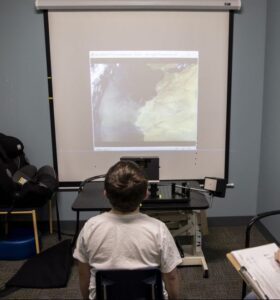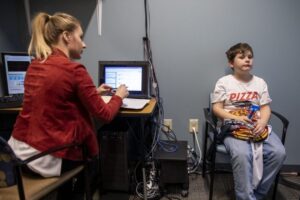Since its inception in 2005, the University of Missouri Thompson Center for Autism and Neurodevelopmental Disorders has served as a national leader in autism research, advancing the field by improving diagnostic measures, identifying genetic markers that cause autism, and developing effective behavioral treatments for people on the spectrum. Now, in its 15th year of autism discovery, treatment and training, the Thompson Center is concentrating on expanding a different phase of autism research: pharmacological clinical trials.
While the Thompson Center has long been a leader in research for behavioral autism treatment, including areas such as Applied Behavior Analysis (ABA) and Social Competence Intervention (SCI), the center, its research core and its leading researchers are now well positioned to 
“One of the most exciting areas of autism research is developing and testing new pharmacological interventions,” said Dr. Stephen Kanne, the executive director of the Thompson Center. “The scientific approach to truly understanding whether your treatment is making a difference is called a clinical trial. We are well positioned here, with our amazing combination of expert faculty and staff, to begin pursuit of this type of research.”
“Clinical trials are important in that they can lead to better treatments to address specific symptoms or behaviors,” said Nicole Takahashi, adminstrator of the Thompson Center research core. “It is important for the Thompson Center to be involved in cutting-edge research that has the potential to benefit a large number of patients.”
Running clinical trials can be very demanding and time consuming, Kanne says. A strong infrastructure is needed to run trials correctly. This infrastructure includes specific equipment needs, collaborations with other hospital entities and the personnel with the required expertise. Several of these requirements are met through the Thompson Center research core. This core of expert autism research staffers provides support to the lead investigators, allowing promising results from clinical trials to be achievable.
“Clinical trials require a great deal of coordination with service operations outside the Thompson Center (i.e. phlebotomy, laboratory, cardiology etc.) as well as access to medical expertise,” Takahashi said. “While most trials 
Currently, the Thompson Center has three ongoing clinical trials, all led by Dr. David Beversdorf, a Thompson Center researcher and professor of radiology, neurology and psychology in the University of Missouri School of Medicine. The first clinical trial conducted at the Thompson Center is nearing its conclusion, with early results appearing promising.
This trial, funded by the U.S. Department of Defense, is examining the use of propranolol, a common blood pressure drug, to help reduce anxiety and improve social functioning in children with certain types of autism. Beversdorf says that while the process of conducting this type of research is challenging, the Thompson Center and its resources are up to the task.
“Beyond the needed infrastructure, recruiting is a second challenge to clinical trials,” Beversdorf said. “The research core also is critical to this mission. The many wonderful families that visit the Thompson Center for clinical treatment are given the option to be considered for potential research opportunities, and we are able to meet the needs for recruitment into studies as a result of their support.”
Takahashi’s team manages a large database of potential research participants, providing Thompson Center researchers with access to a large autism population. Takahashi also credits the Thompson Center’s clinical staff, including physicians, a nurse practitioner and nurse clinicians, as well as clinical services made possible through the University of Missouri to support trials as well as train research core staff to perform assessments.
The second ongoing clinical trial is examining the use of minocycline, a common acne drug, as a means to improve social communication among 
“The advantages of having the involvement of our expert nursing staff and physicians, the family resource team, the psychologists, and the behavioral intervention specialists in the care of families also helps keep families engaged by providing a full range of support for their care. This also allows clinical trials to succeed as an added opportunity.”
The third clinical trial is currently in its early stages and involves the testing of a drug developed by the pharmaceutical company, Otsuka, for potential use in treating autism symptoms. Beversdorf says working with his patients on a regular basis drives his passion for investigating all avenues for potential treatments that could improve lives.
“As a physician who personally observes the needs of families with autism, I want to bring forward all possible opportunities,” Beversdorf said. “The potential to see if new therapeutic approaches are beneficial becomes a valuable option to try to help.”
“As we learn more about how autism presents, and how truly diverse a disorder it is, we are also learning that different treatments may work better than others depending on a child’s specific autism symptoms,” Kanne said.
While there are currently three ongoing clinical trials, Thompson Center researchers are working to gain funding and approval to begin others in the future. A future that promises to be filled with more and better treatments for all people with autism.
Highlighting the promise of personalized health care and the impact of interdisciplinary collaboration at the NextGen Precision Health Institute, this type of research is part of the systemwide NextGen Precision Health Initiative dedicated to solving the world’s most critical health problems. Partnering together with government and industry leaders, the NextGen Institute at Mizzou empowers bold cross-disciplinary innovation and life-changing precision health advancements targeting individual genetic, environmental and lifestyle factors.

